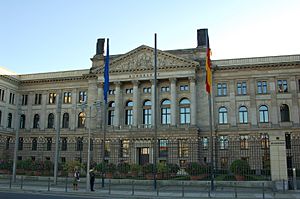Bundesrat (Germany) facts for kids
| Germany |
 This article is part of the series: |
|
|
|
|
|
|
|
Other countries · Atlas |
The Bundesrat is an important part of Germany's parliament. It represents the 16 different states (called Bundesländer) that make up the country.
The governments of each German state choose people to represent them in the Bundesrat. These representatives are usually members of the state government. They can be changed at any time by their state.
Most German states have a leader called a Minister-Präsident (which is like a Prime Minister). Three states are special "city-states" and have a Mayor as their leader. These leaders take turns being the chairman of the Bundesrat for one year.
Germany does not have a vice president. If the Federal President cannot do their job, the President of the Bundesrat can step in to help.
Where the Bundesrat Meets
Even though the Bundesrat is part of Germany's parliament, it does not meet in the same building as the Bundestag. Instead, the Bundesrat has its own offices and a modern meeting room. These were built inside the old Prussian House of Lords building.

How Many Members and How They Vote
The Bundesrat has 69 members in total. The number of representatives each state sends depends on how many people live in that state. For example, Bremen is the smallest state and sends three members. North Rhine-Westphalia is the largest state by population and sends six members.
When the Bundesrat votes, most decisions need an absolute majority. This means at least half of all possible votes, which is 35 votes. Some very important decisions need even more votes, requiring two-thirds of all possible votes, which is 46 votes.
Each state must vote as a single group. This means that all representatives from one state, like Berlin, must vote the same way. They cannot vote differently from each other. Even if a state sends only one person, that person still casts all of the state's votes. Usually, the Minister-President of a state casts all of their state's votes.
If a state has a coalition government (meaning two or more political parties are working together to govern), then all parties must agree on how to vote in the Bundesrat. In 2002, the state of Brandenburg could not agree on how to vote about a new law. Because of this, the Federal Constitutional Court decided that the law was not valid. This happened because Brandenburg's vote could not be counted, and the law did not get enough votes in the Bundesrat.
Images for kids
-
The House of Lords of Prussia on Leipziger Straße, seat of the Bundesrat.
See also
 In Spanish: Consejo Federal (Alemania) para niños
In Spanish: Consejo Federal (Alemania) para niños
 | Audre Lorde |
 | John Berry Meachum |
 | Ferdinand Lee Barnett |



